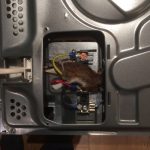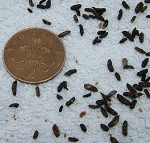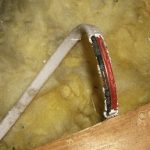Pest Control: Mice
We get rid of mice.
Signs that you have mice
If you are hearing noises such as scratching, gnawing, thumping or bumping, maybe noises in the wall, ceiling or floorboard, then it could be mice. Both mice and rats are typically active throughout the night.
Another sign is tiny black “Rice-shaped” droppings in your property, especially in the loft, kitchen or storage area.
Have your electricity cables been chewed, maybe you have pipes or cables damaged on your dishwasher or washing machine? Alarm cable damage?
Have you found chewed or otherwise damaged food packaging?
Maybe you have had a nasty smell in the house, or a mystery fly invasion?
There are two types of mouse encountered in buildings, house mice and wood/field mice. They are different in their lifestyle and the way they are controlled.
Any of these problems may indicate mice living in your property, it’s time to call a professional pest expert.
Why choose us to treat your mouse problem?
We have over 20 years of experience treating mouse infestations in all sorts of situations, so we are well equipped for any situation and will bring your mice under control with the most effective methods and with the least impact on the environment. The control of mice in your property will be carried out for you with complete professionalism, giving you peace of mind that any pets or children will be safe.
It is important with rodent problems to try and tackle the source. Finding the way they get in is not easy. We like to think and work a little differently to other firms and sometimes, a proper inspection, good advice and some free thinking may help you get rid of mice permanently. For some properties, their age, construction and location make them under constant threat from mouse invasion for which we offer pest monitoring incorporating mouse control measures.
Why do mice need controlling, and what damage can they do?
Mice will contaminate food, food preparation and storage areas with urine and droppings. There are a range of diseases carried by mice that are transmissible to humans through their droppings and urine.
A common myth is that mice are incontinent, this is not true. However, they do urinate and defecate frequently and this is how contamination occurs. They will also cause damage to domestic and commercial property primarily due to their constant need to chew. Mice will chew almost anything to keep their teeth at the correct length.
They are very likely to chew electrical cables or plastic water pipes resulting in expensive wiring repairs or water damage. Modern electrical circuitry standards help avoid the risk of fire, although damaged wiring will still need to be repaired. they are a very common cause of burglar alarm failure due to chewed wires.
You may have seen mice in or around your home, or you may have heard noises such as scratching or gnawing in the loft, or found mouse droppings under the kitchen sink or in food cupboards. These signs need to be investigated. Dead mice in the wall cavity may cause a smell and attract flies, and uncontrolled, mice in the house will eventually cause a building to smell.
If mice are making nests in your loft then you need to take immediate action. Mice nesting indicates a settled environment for them and their numbers are likely increase especially with the house mouse.
How are mice controlled?
There are hundreds of different anecdotes on how to get rid of mice, but the most successful way to control mice is with modern traps or rodenticides which are humane in their action. This must be used in conjunction with habitat management and proofing to make the affected areas less appealing to mice, and blocking the way in.
It is imperative that rodenticides are used correctly by a professional to achieve proper control of the population, and also to protect non-target animals. We are more frequently using pesticide-free methods of control. Please ask if this is a preferable method.
DIY Mouse Traps & Pest Control
Trapping has always been the favoured DIY method to get rid of mice, but what is the best trap for mice?
There are plenty of mouse traps around, the choice is bewildering! This article will help you to decide if traps are your preferred method of control and which to mouse traps to choose.
Humane traps
Humane is the term often adopted for many designs of traps that catch mice alive and without harm. On the face of it, this seems like the perfect option but it can rapidly become a very cruel way to get rid of mice.
Firstly, you must be prepared to check the trap regularly, which means AT LEAST night and morning. The trapped mouse has no access to food or water and therefore every hour spent caught in the trap, it is likely to suffer. All too often, these traps are forgotten and the mouse dies from starvation – hardly the humane intentions that you set out with. If you have been careful and checked regularly, you may find yourself with a healthy mouse in the trap, but what now?
If your plan is to release the mouse, you are once again faced with a dilemma – release the mouse nearby and risk it coming back into the house, or release it several miles away? Releasing a territorial animal, such as a mouse away from its home range is cruel – it has no idea where to obtain food or shelter, and will be subject to many squabbles with local mice as they defend their territory. Their prospects for survival are extremely slim. You will also find yourself breaking some animal welfare laws, albeit, for a mouse!
Snap (break back) traps
These are actually the most humane method of catching mice. The mouse is killed instantly if the trap is correctly set and is of good quality. The term ‘good quality’ means having a strong spring and a sensitive trigger. You must still check these mouse traps regularly for badly caught and dead mice. Skilfully used, and in conjunction with other pest control methods, these can reduce or eliminate mice from your property.
Repellents and sonic devices
Despite high claims, we have treated mice in many properties where these devices are installed. There is no scientific proof that they actually work.
If trapping does not appeal to you, or the mouse infestation is out of hand, it is probably wise to call us. We will recommend the best course of action.
Mouse biology
Mice eat nuts and seeds as their principal food, but will also eat insects and meat so they are considered omnivorous.
The 5-6 young mice are born hairless and blind in a nest made by the female. They are weaned at 3 weeks old, and are sexually mature at 8-12 weeks.
The gestation period is 17-20 days and potentially mice can give birth every 28 days, so infestations can increase rapidly if conditions are favourable.




